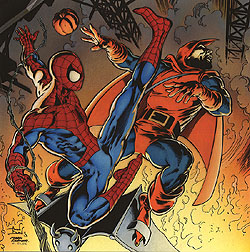We'll start with what I think is the best Covid horror movie we've gotten in these last five years. Deep in rural Argentina, two brothers (Ezequiel Rodriguez and Demian Salomon) learn that one of their neighbors has become a “rotten,” a person used as an incubator for some demonic figure. They try to deal with the issue themselves without using the proper rites of exorcism and almost immediately, an evil force spreads mercilessly like a contagion.
Demonic possession as disease was a unique way to freshen up what had become a pretty generic subgenre, but it wasn't done just for novelty. About halfway through the movie, the brothers meet up with an experienced exorcist named Mirta (Silvina Sabater) who lists several important rules to prevent possession. Then the rest of the characters spend the second half of the movie breaking them. Viewers are left to shake their heads in frustration as more possessions are enabled by people who know they're making a mistake but are too overwhelmed by anger or despair to help themselves. And that's just the story of the Covid plague, isn't it? Despite some confusion in the early weeks, it wasn't long before we had strategies to keep from catching and spreading the disease. Yet for all manner of reasons, people just couldn't stick to them even as the body count got higher and higher.
Halloween Ends (2022)
I know, I know, just hear me out. The first installment of this modern "requel" trilogy came out in 2018 and made a fortune at the box office, so the producers were eager to get the other two into theaters ASAP. But then Covid came along and put it all on hold. The second movie, Halloween Kills, was a fairly straightforward slasher that come out in Fall 2021, when people were only just starting to go back to movie theaters. The final movie in the trilogy was where the impact really became visible.
The fans absolutely hated this one, mostly because of the unexpected focus on a bullied, misunderstood young man named Corey who starts to take over the legacy of murder from an aging and tired Michael Myers. But when I was watching it, the most striking character was Haddonfield, Illinois itself - the longtime setting for this franchise was depicted as bleak, lonely, and just beaten down by so many years of violence and death. Obviously you don't expect this from a mascot-driven slasher movie, but Covid left a mark on all of us and in hindsight, it's hard to imagine the filmmakers wouldn't be affected too. It's not even especially subtle - Michael is explicitly referred to as a "virus" multiple times.

I'm grouping these two together because they're quite similar in concept and themes, although they ultimately arrive at opposite conclusions. In Never Let Go, Halle Berry plays an unnamed woman hiding in a decrepit cabin with her two sons, Nolan and Sam. To protect themselves from “the evil” that lurks in the nearby woods, they are only allowed to leave home if they are attached to long ropes tied to the house. The rules don’t make a lot of sense and the stress of a tough winter starts to fray the fragile balance that has sustained these family dynamics. For most of the movie, the viewer is invited to sympathize with the children and suggests that their mother might be mentally ill. However, without saying too much, the final scene reveals she was right all along.
Brick (2025)
This German film is less a metaphor for Covid itself than for the experience of having to quarantine. A couple on the verge of breaking up wakes up one morning to find that all the doors and windows in their apartment have been sealed off with thick metallic bricks and the phone and internet are out of service. Quarantine may have kept some of us safe from disease, but there are some pretty severe drawbacks depending on what your situation is. The various neighbors the lead characters encounter represent some of these, such as a different couple whose relationship seems to be a dangerous place, and an elderly man with demanding medical needs. It doesn't come out for or against lockdowns, it just explores some of the anxiety that comes with them.
28 Years Later (2025)
I only just saw this one, so I had to turn this around pretty fast. It has a very complex commentary on how Covid affected (primarily British) society and I've had the least amount of time to ruminate on it, but we'll give it a shot. The original 28 Days Later used the premise of a zombie virus to examine anxieties in the new post-9/11 world, but now director Danny Boyle and screenwriter Alex Garland have both returned to the series at a time when a deadly worldwide plague is still a fresh memory (even if our culture is doing its best to get us to forget it).








No comments:
Post a Comment